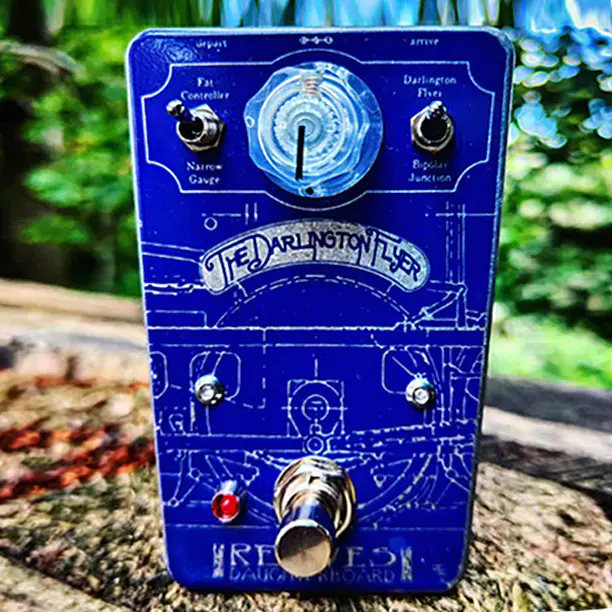
The Reeves Electro The Darlington Flyer is the first PCB-based pedal by a builder based in Northamptonshire, UK, known for its quality point-to-point designs. Hosted in a beautiful trapezoid blue enclosure, this is a fuzz with two very different voices both leveraging a different silicon transistor.
Via the toggle switch on the right, you can select a 1979 Motorola MPSA013 Darlington transistor for a smooth and compressed sustain, or an early ’70s Micro Electronics ME4003 for a more open, gritty tone with a slightly gated character.
The fuzz level is fixed to the optimal level, while the only knob allows control over the device’s volume, and another toggle (on the left) delivers two levels of “fatness.”
Reeves Electro Darlington, Builder’s Notes
The first release in the new PCB based Daughterboard series, build entirely by Izzy Reeves.
A single transistor fuzz, although the Darlington Flyer is switchable between two very different sounding transistors. One is a 1979 Motorola MPSA013 Darlington for smooth, compressed sustain, the other an early 70s Micro Electronics ME4003 for a much more open gritty and slightly gated feel.
Fixed fuzz with a volume and fat / skinny switch.
Honestly it’s a beast.
Izzy builds these fuzz pedals in our garden workshop in Northamptonshire UK. This includes painting, drilling, and screen printing the design onto the enclosures. Izzy populates the vintage style circuit board with the finest components. We finish the entire pedal to a standard that looks as good inside, as it sounds on the outside. It might be covered up but when you’re in that moment you KNOW the mojo you have under the hood.
Please be aware, these are totally hand built and so there might me some slight cosmetic variation between each pedal. Toneally, I play each one to make sure they sound as good as the first one, before signing off, no tone generator, no gadgets – just a telecaster and my ears.
Please note, all my silicon pedals have a boss style 2.1 center negative DC jack only, there is no battery snap. silicon transistors are not sensitive to DC supply type unlike their germainium counterparts.






















